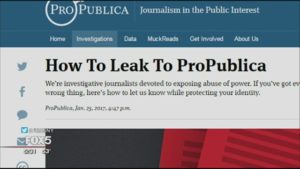 The press, and by that term I mean the media industries devoted to journalistic enterprise, love a good leak. Inside information not intended for public consumption that suddenly appears in a package tied with a pretty bow is a gift of great value and consequence.
The press, and by that term I mean the media industries devoted to journalistic enterprise, love a good leak. Inside information not intended for public consumption that suddenly appears in a package tied with a pretty bow is a gift of great value and consequence.
Leakers come in every form imaginable, and do so for a wide variety of reasons: true whistleblowers looking out for some greater good, disgruntled employees who don’t like what they see happening behind closed doors, an injured party to a dastardly deed, or hackers looking to profit from rich corporations (e.g., the hack of HBO and threat to leak spoilers for upcoming episodes of Game of Thrones)…all find reasons to go the the press with their inside scoop.
It strikes at every level of nearly every organization or power structure. It is one of the power levelers—a way for those near the bottom to inflict damage on those near the top. Presidents, CEOs, celebrities, and clergy…all are susceptible to a well-timed leak.
Sometimes the leaker is passing along information that they came by honestly, and other times it may involve a breach of security protocol or even illegal hacking.
Recent leaks have been widely reported, including: the DNC emails hacked (or were they?) and released to Wikileaks last year, transcripts of President Trump’s phone calls to heads of state, Jared Kushner’s off-the-record meeting with congressional interns (see Wired magazine), FBI director Comey’s anonymous leak to the press, and the leak of an internal memo at Google that ignited a firestorm of controversy over sex discrimination in the tech industry (see more here and here). The last example also raised questions about when and where it is safe to speak out when speaking out may be controversial and politically incorrect.
In all of these cases the leakers were only part of the equation. The leakers need the assistance of a willing journalist and a willing publisher to distribute the information to the public. Journalistic history is filled with stories about investigative reports that broke because of leakers; perhaps the most infamous being Deep Throat of Watergate fame. But these symbiotic relationships are risky when the motives of leakers are unclear. Leakers may be seeking revenge, or may even leak information in an attempt to promote their own agenda. Sometimes those in positions of power use leaks through intermediaries in order to advance their own version of events. Without corroborating evidence, a leak is simply a rumor…or worse.
The legality of leaking to the press is complicated. Prosecution of illegal leaks that compromise national security is rare but does happen, e.g. Chelsey Manning’s conviction and sentence, which was later pardoned by President Obama. But more often than not the leaker and the news organization escape punishment. This inclination to protect journalists, and their sources, is part of our First Amendment tradition.
For more information about leaks and the media, see this page at the Newseum and listen to this podcast at On The Media.
